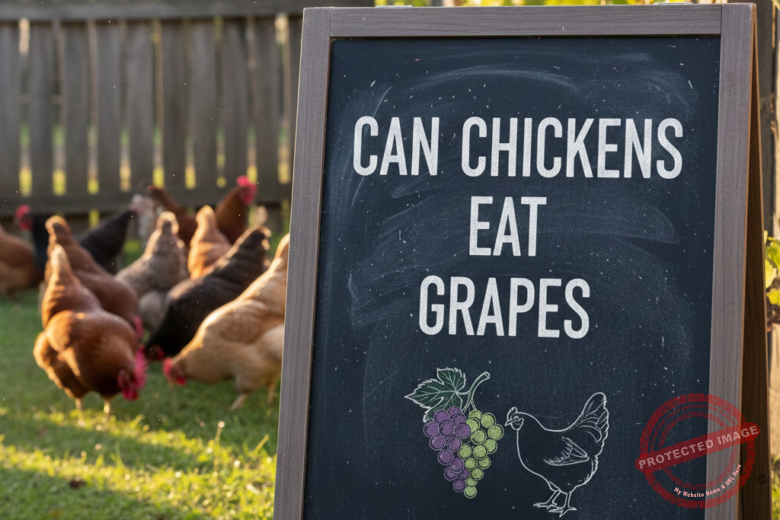Chickens are omnivorous creatures known for their diverse dietary preferences. While their main diet consists of grains, seeds, and insects, they can also enjoy a variety of fruits and vegetables. Grapes, in particular, are a delicious and nutritious fruit enjoyed by many, but can chickens eat grapes?
Yes, chickens can eat grapes, but it is important to remove the seeds and skin and feed them in moderation to avoid digestive issues.
In this article, we will explore the topic of feeding grapes to chickens and provide insights into the toxicity and nutritional value of grapes for our feathered friends.
Can Chickens Eat Grapes: Understanding the Toxicity and Nutritional Value
Understanding the Toxicity of Grapes for Chickens
Grapes, although a delightful treat for humans, can pose potential health risks for chickens if consumed in large quantities. The skin and seeds of grapes contain a natural compound called tannin. While humans have a higher tolerance for tannins, chickens are more sensitive to this substance.
Excessive consumption of grapes, especially with seeds and skin, can lead to digestive issues in chickens. The seeds contain compounds that may cause obstructions in their digestive tract, potentially resulting in discomfort and even intestinal blockages. In addition, the skin of grapes can be challenging for chickens to digest, leading to digestive disturbances.
The Nutritional Value of Grapes for Chickens
Despite the potential risks, grapes can provide some nutritional benefits when given to chickens in moderation. Grapes are a rich source of vitamins, including vitamin C and vitamin K, as well as minerals like potassium and manganese.
These nutrients contribute to the overall health and well-being of chickens, supporting their immune system and promoting proper bone development.
Moreover, grapes contain antioxidants, such as resveratrol, which have been associated with various health benefits in humans. While the extent of these benefits for chickens is not fully understood, it is believed that the antioxidants present in grapes may offer some protection against oxidative stress.
Safely Feeding Grapes to Chickens: Dos and Don’ts
When it comes to feeding grapes to chickens, it is crucial to follow certain guidelines to ensure their safety and well-being. Here are some dos and don’ts to consider:
Dos:
Introduce grapes gradually:
Start by offering small quantities of grapes to assess your chickens’ tolerance and any potential adverse reactions.
Remove seeds and skin:
Before giving grapes to your chickens, it is advisable to remove the seeds and peel off the skin. This reduces the risk of digestive problems and obstructions.
Cut grapes into small pieces:
To make it easier for chickens to consume grapes, especially if they are larger varieties, cut them into smaller, bite-sized pieces.
Moderate portion sizes:
Limit the amount of grapes you offer to chickens. Treat grapes as an occasional snack rather than a significant part of their diet.
Don’ts:
Avoid moldy or spoiled grapes:
Only provide fresh, ripe grapes to your chickens. Moldy or spoiled grapes can be harmful and may cause digestive upsets.
Do not overfeed:
While grapes can be a tasty treat, excessive feeding can lead to digestive issues. Remember to provide a balanced diet that includes a variety of foods.
Avoid artificial additives:
Do not feed chickens grapes that have been treated with artificial additives, such as preservatives or sweeteners. Stick to natural, organic grapes.
By following these guidelines, you can safely incorporate grapes into your chickens’ diet as an occasional and enjoyable treat.
Can I feed grapes to chicks?
Grapes are not recommended for very young chicks, as their digestive systems are still developing. It is best to wait until they are older before introducing grapes into their diet.
Can chickens eat all types of grapes?
Chickens can eat various grape varieties, but it is important to ensure they are fresh, ripe, and free from any additives or mold.
How often can I feed grapes to my chickens?
Grapes should be offered as an occasional treat, rather than a daily staple. Feeding them once or twice a week is generally considered appropriate.
Are raisins safe for chickens?
Raisins are dried grapes and can be fed to chickens in moderation. However, they should be free from any added sugars or preservatives.
What other fruits can chickens safely eat?
Chickens can enjoy a variety of fruits, including berries, melons, apples, and pears. Just like with grapes, moderation is key to maintaining a balanced diet for your chickens.
Conclusion
In conclusion, chickens can eat grapes, but it is essential to exercise caution and moderation. While grapes offer nutritional benefits, the toxicity of grape seeds and the challenges associated with digesting grape skins should be considered.
By understanding the dos and don’ts of feeding grapes to chickens, you can provide them with a safe and enjoyable snacking experience. Remember to prioritize a balanced diet for your chickens, with grapes serving as an occasional supplement.
